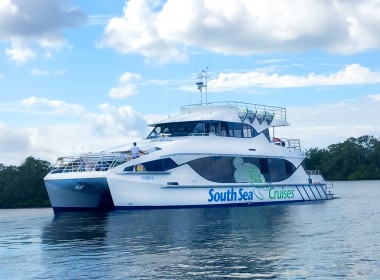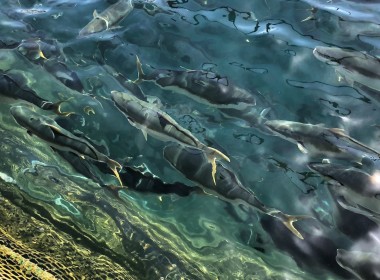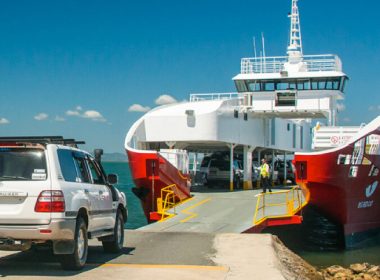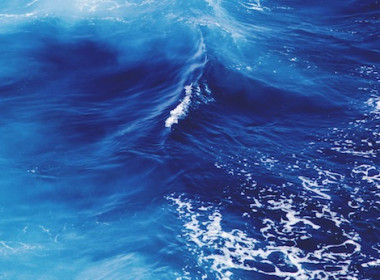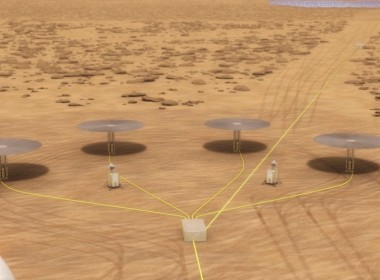COLUMN | Braveheart re-emerges in Fiji [An Innocent Australian]

Experienced taxi drivers are a good sounding board regarding the state of a nation. After some years of assorted opinions from the spectrum of angry, happy, and quiet passengers, they can pretty well give you an accurate opinion without having to conduct a national poll.
In a past column, I wrote about the “Leadership qualities of a long dead parrot”, where I was lamenting the abysmal level of leadership on both sides of the spectrum within Australian Federal and State governments.
As one of the 340,000 Australians who visit the Fiji Islands in a typical year, I spent last week in Fiji, and on arrival, my Indian taxi driver spoke highly of the attitude and aspirations of the new government under the leadership of Sitiveni Rabuka, in particular his bold visions.
“The combination of an overbloated and inefficient bureaucracy and a desire to support domestic shipbuilders in marginal seats has produced a string of less-than-optimal vessels.”
In 2002, the then ex-prime minister Rabuka, the leader of the ‘87 coup, was a keynote speaker to the Interferry conference on the Gold Coast, the conference theme being Ferries for Defence and Emergency Response.
“Do not treat us like beggars, giving us aid that is unsuitable,” Rabuka advised the 450 delegates from 43 nations. “Like all the nations in the South Pacific, when we have hundreds of our people on a beach after a cyclone or tsunami, we do not need expensive, deep-draught patrol vessels than can only carry 14 people and a gun. We need vessels that can land bulldozers, medical units, generators and the like. We need practical equipment.”
Despite high-ranking naval officers and a multitude of media at that conference, Australia ignored Rabuka’s suggestions.
Regrettably, Australian marine aid to the South Pacific over the past few decades has been appalling. The combination of an overbloated and inefficient bureaucracy and a desire to support domestic shipbuilders in marginal seats has produced a string of less-than-optimal “patrol boats” that adversely affect the GDP of all the recipient South Pacific nations, even when idling alongside their berths, which is what they spend most of their time doing because these nations can’t afford the diesel to run them. Poorly designed for navigating through coral channels, their exposed propellers and rudders are readily destroyed, as the Australian-donated Samoan patrol vessel discovered two years ago.
After the vast expense of lifting the stricken craft by submersible barge, and transport to Cairns, it was declared a total loss. The smiles around the table of the Samoan government were quickly wiped off when Australia’s new Foreign Minister, Penny Wong, arrived on her first visit, and gifted yet another (ironically named) Guardian patrol boat.
“The only real beneficiary of Australia’s five decades of questionable marine gift-giving to the Pacific is the Chinese Communist Party, who begin aid discussions with a question rather than an announcement.”
Fiji’s problems are the same as every other regional nation, but instead of meekly following in the meandering footsteps of its two bedwetting big brothers Australia and New Zealand, Rabuka has decided to grasp the nettle and handle his challenges in order of priority.
He has announced the revitalisation of the Fiji shipbuilding industry by committing to two new shipbuilding docks near the port of Lautoka. While ship repair is busy in Suva and Lautoka, actual shipbuilding has been closed for 20 years. Before that, the government shipyard in Walu Bay, an open exposed slipway construction site built by the British on the rainy side of the island, was the major source of skills training for the whole of Fiji for 60 years. Armies of welders, carpenters, plumbers, electricians, draughtsmen, and administrators gained their stripes at the shipyard, building vessels up to 75 metres.
Now with many tradesmen gone in pursuit of higher wages in Australia and New Zealand, and many of the youth unemployed, Rabuka sees that undercover graving dock facilities on the drier side of the island will achieve some key objectives:
- It will re-establish the skills training needed within the country.
- Vessels he has chosen to build will take many trucks off the road.
- This will reduce the nation’s road maintenance spiralling cost of FJ$400 million per annum.
- This will reduce the import of diesel of around FS$900 million, as ships use only four per cent the diesel requirement of trucks.
- Under a Dorman Charter, the same vessels will be immediately available for defence and emergency response.
Unlike some of the South Pacific leaders who kowtow and graciously thank the donor for something unusable by their people and economy, Rabuka prefers to speak plainly. This does not always win him friends with donor country bureaucrats. The only real beneficiary of Australia’s five decades of questionable marine gift-giving to the Pacific is the Chinese Communist Party, who begin aid discussions with a question (i.e., “What do you need?”) rather than an announcement (i.e., “A patrol vessel is what you shall have.”).
As you might expect, China’s record of making inroads into south west Pacific Nations has been a “wok in the pak”.
“We need bold, experienced leaders with resolve and passion for their nation all around our region, and I congratulate the Fijian people for making a good choice.”
Ask yourself, is Australia addressing key issues of skills training, taking trucks off the coastal roads, reducing our burgeoning road congestion, road deaths and accidents, and having ourselves prepared for addressing defence and emergency? Watch this short YouTube video here.
Or are we too stupid by spending trillions on renewables and allowing this gargantuan misallocation of industrial scale capital to weaken our nation to achieve anything sensible, including defending ourselves? Or are we too stupid by focusing the whole nation on creating yet another level of aboriginal bureaucracy?
In a clean sheet national scenario, to protect your nation from the 2023/24 impending threats, you as head of the committee selecting a leader, would you pick a Davos-trained ex-bureaucrat, ex-PM like Jacinda Ardern, or an ex-PR and ex-PM like Scott Morrison, or the tepid UN-focused Anthony Albanese, or Sitiveni Rabuka, a trained soldier who understands emergency situations and how to tackle a variety of adversaries and obstacles?
As we all saw in the 1995 hit motion picture Braveheart, when faced with overwhelming odds and political risks, we need leaders with experience, courage, and practical wisdom for their nation. We need bold, experienced leaders with resolve and passion for their nation like Rabuka all around our region, and I congratulate the Fijian people for making a good choice. I only wish he was ours.


